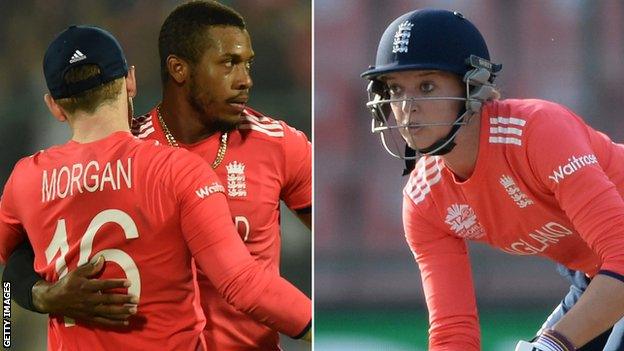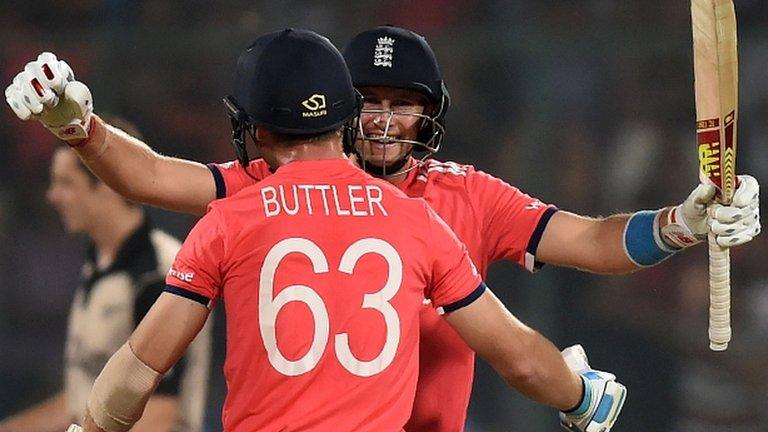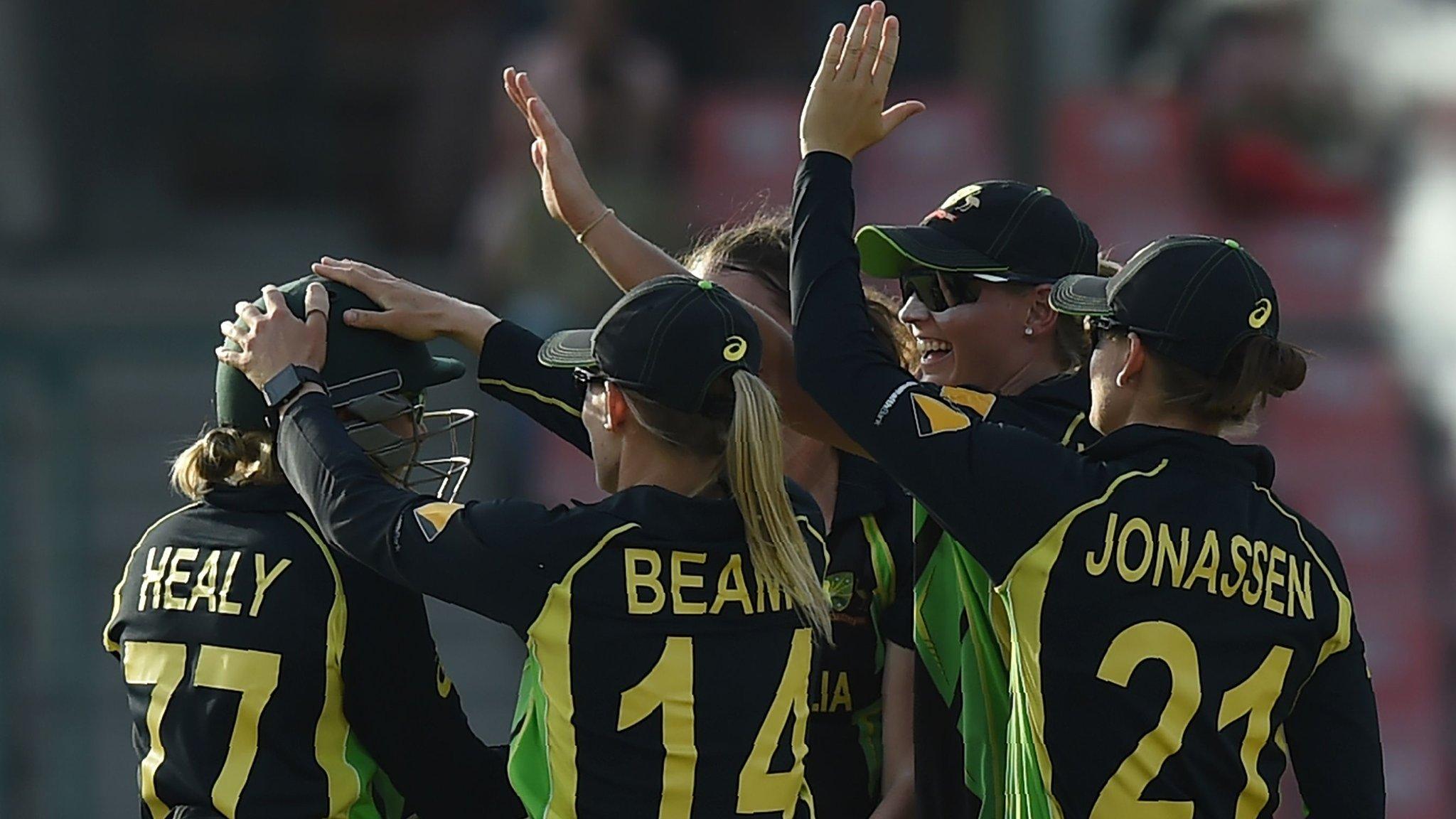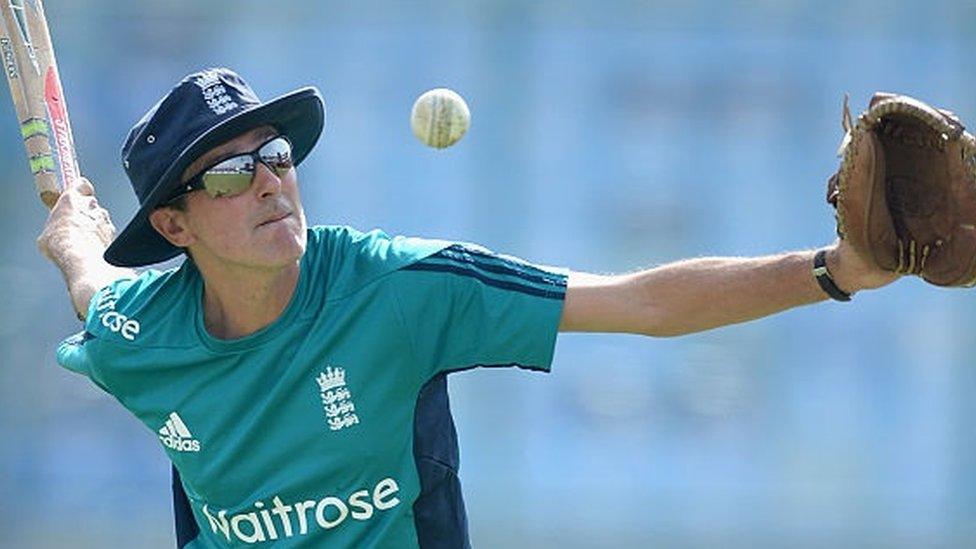World Twenty20 2016: Jonathan Agnew on England's semi-finals
- Published

England's men and women enjoyed contrasting fortunes
England's performance in defeating New Zealand in the semi-finals of the World Twenty20 was just about perfect. They would have beaten anybody.
Their fielding, a problem in the past, was outstanding, while Chris Jordan and Ben Stokes kept their cool to bowl some humdinging yorkers at the death. In restricting the Black Caps to 153-8, they had a target that was about 20 runs light.
Then, Jason Roy played an absolutely superb innings to blast 78 from 44 balls. As a fielding team defending a below-par score, that sort of assault really knocks the stuffing out of you. By the time he was out, the game was effectively over.
There's a real irony to the fact that it is New Zealand who England dumped out en route to their second World Twenty20 final.
A little over a year ago at the World Cup in Wellington, the Kiwis dismembered an England team that put in a horrendous display.
That defeat, part of an equally dreadful tournament for England, was the catalyst for them to take a real hard look at the way they play limited-overs cricket.
Their inspiration to improve came from the fearless, ultra-aggressive style championed by New Zealand and their then captain Brendon McCullum.
Now, an England copying the attitude of the Black Caps have vanquished a team that had won all four of their games in India.
However, there is more to it than fearlessness. England are also a better, more confident side from their experiences in this competition.
They conceded 229 against South Africa, yet still chased the runs. They were reduced to 85-7 against a very talented Afghanistan side and still found a way to win. These experiences give Eoin Morgan's men the belief they can win from anywhere.
It is one they will take with them to Sunday's final, whether they play against India or West Indies. England, quite rightly, will believe they can win.
If they meet India, they will be coming up against a side who may share the same belief - the hosts too have won games they should have lost, so could feel their name is on the cup.
It would be difficult taking on India with all their home support and England will hope that the pitch does not play too big a part in the outcome.
Former India captain Sourav Ganguly, who is in charge at Eden Gardens, has said he wants a really good cricket wicket because it will be under the microscope. That being said, India's presence in the final could yet see that pitch made to help the spinners. It would be a shame if it does.
If England come up against West Indies, then the confidence they have gained since they lost their opening match to them should lead to a different approach to dealing with Chris Gayle.
Then, they looked a touch intimidated and Gayle promptly took them for a 47-ball hundred. Now, I'd expect England to get stuck in, banging the ball into his armpits to make him feel all of his 36 years.
Whoever they meet in Kolkata, England have a real chance to add to their T20 success of 2010, external for only their second major limited-overs trophy.
In contrast to the complete performance the men put it, England's women were desperately disappointing in losing their semi-final to Australia by five runs.
Chasing 134, they had the game in the bag but, as has been the case in the rest of the tournament, the middle order was anonymous.
Openers Charlotte Edwards and Tammy Beaumont added 67 in 10 overs, only for England to then lose seven wickets for 50 runs.
It was a catalogue of poor shots from experienced players, who showed naivety to take the wrong options given the situation they were in.
Take Sarah Taylor, someone who has played 81 international T20s, as an example. Yes, she made 21, but the shots she played were not right percentage-wise. There were too many risks for the meagre rewards on offer.
There were dinky reverse-sweeps and ramps, rather than hitting the ball down the ground or working it into the leg side and running hard. Eventually, a tame reverse-sweep ended in the wicketkeeper's gloves.
Run chases aren't glamorous, they are about nailing it down and getting over the line. That's what should have been done.
Coach Mark Robinson said the players aren't fit enough - I don't know if I agree with that. He also said there was one boundary in it, which is true, but that's not the reason why they lost. They were beaten by their own headless approach.
These are very talented, well-coached cricketers, but the thought is not there. They have not won a global trophy since 2009 and last summer they surrendered the Ashes to Australia.
For the resources available to them, they should be doing much better.
Jonathan Agnew was talking to BBC Sport's Stephan Shemilt
- Published30 March 2016

- Published30 March 2016

- Published30 March 2016

- Published10 March 2019

- Published15 May 2018

- Published18 October 2019

